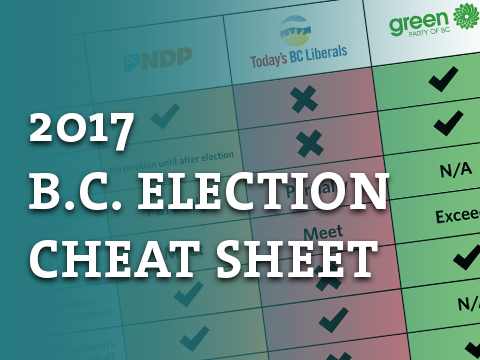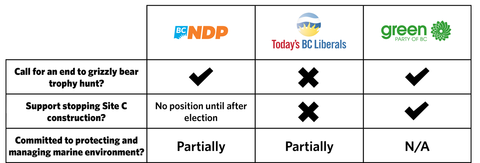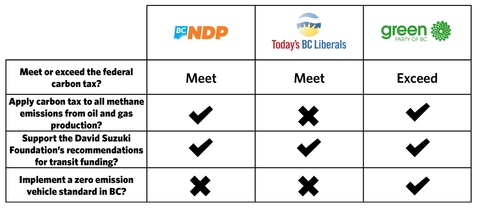B.C. election 2017: Where the parties stand on key environmental issues

To help you make your decision May 9, the David Suzuki Foundation compared party positions on environmental issues we care most about to help educate our supporters and the public.
We base our positions on the best available science, our mission to protect the diversity of nature and our vision that, within a generation, Canadians act on the understanding that we are all interconnected and interdependent with nature.
If party positions were not public (e.g., in official platforms, media declarations), we asked parties to provide information. "N/A" (not available) on our cheat sheet means we did not receive a response to our questions from the party.
To be included in our analysis, parties must meet two of these three criteria: Have candidates in at least 90 per cent of ridings; received at least 10 per cent of the popular vote in 2013; have at least one seat in the legislature.
Here's a deeper dive into the B.C. Liberal, NDP and Green party positions. Check back to this blog for updates as they come in.
Biodiversity
Grizzly bear trophy hunt: DSF supports ending the grizzly bear trophy hunt.
The Liberal party will continue the grizzly bear trophy hunt, defending and promoting it as "well-managed" and sustainable. They will work to end hunting in the Great Bear Rainforest only. The B.C. government has ended grizzly hunting among highly threatened sub-populations in the Interior and southern parts of the province.
The NDP and Green parties would ban grizzly trophy hunting, but allow grizzly hunting for food. The NDP is leaving open the possibility for hunts where the grizzly meat is consumed. The Greens would make it a rule that anyone who kills a grizzly bear would have to cart the meat out to their home, to discourage hunts by foreigners.
Site C dam: DSF does not support the continuation of Site C dam construction.
The Liberal party says Site C dam is the only way to reliably provide clean energy to B.C.'s growing population over the next 20 years. They point to jobs, clean affordable power and economic benefits.
The NDP will wait to take a position on Site C until after the election. NDP Leader John Horgan says he would shut down the hydroelectric dam if a B.C. Utilities Commission postelection review supports that decision, but does not yet have enough information to take a formal position.
The Green party says that Site C dam is environmentally, economically and socially reckless and would stop construction.
Protecting and managing marine environment: DSF supports funding and implementing the Marine Planning Partnership marine plans. We do not support increased fossil fuel infrastructure on the coast nor the increased ship traffic and spills that come with an oil and gas focused economic plan.
In August, 2016, the Liberal government signed implementation agreements with 17 coastal First Nations for four Marine Planning Partnership plans for the North Pacific Coast. These have not yet been executed. The Kinder Morgan pipeline project was given the green light to proceed with conditions attached. These include world-leading marine oil spill response and prevention and recovery systems for B.C.'s coastline and ocean, to manage and mitigate the risks and costs of heavy oil pipelines and shipments.
The NDP also supports these marine planning agreements. They would work with First Nations to ask the federal government to include federal jurisdiction areas, including a National Marine Conservation Area within the southern Georgia Strait, within the plans.
Both the NDP and Green parties oppose Kinder Morgan pipeline expansion.
Climate
DSF supports policies that show leadership on carbon taxes; apply the carbon tax to all methane emissions from oil and gas; commit to increasing provincial transit investments to move forward the $8 billion Metro Vancouver transportation plan and bring provincial funding closer to 43 per cent; and implement a zero-emission vehicle standard.
Carbon tax
The Liberal party will extend the freeze on the carbon tax (in place since 2012) to 2021 holding the carbon tax at $30 per tonne. Subject to a fairness review, they plan to match the federal targets for a nationwide carbon tax regime of $40 in 2021 and $50 in 2022. The party commits to hit B.C.'s 2050 emissions reductions target, but not its existing 2020 target.
The NDP would meet the federal targets for a nationwide carbon tax of $40 per tonne, but on an accelerated schedule: $36 in 2020, $43 in 2021 and $50 in 2022.
The Green party plans to increase the carbon tax by $10 each year for four years, beginning January 2018. They will increase the tax to $70 per tonne by 2021 (ahead of Ottawa's schedule). They set an interim target of a 40 per cent reduction to emissions below 2007 levels by 2030.
Carbon tax on all methane emissions from oil and gas
The Liberal party will strengthen reductions to fugitive and vented emissions but not apply the carbon tax to these emissions.
The NDP will expand the provincial carbon tax to include fugitive emissions from oil and gas companies.
The Green party will extend the carbon tax to fugitive and vented emissions starting on January 1, 2018. The initial rate will be $10 per tonne rising to $50 by 2021.
Transit funding
The Liberal party will match $2.2 billion in federal funding for proposed major Metro Vancouver transit expansion projects. They will pay for one-third of the Pattullo Bridge replacement and would require local Metro Vancouver mayors to hold another referendum to raise money for their part of the Broadway Subway and Surrey LRT.
The NDP also committed to match federal funding of $2.2 billion for major transit expansion and support the transportation framework put forward by Metro Vancouver mayors. It also committed to $360 million for new rail cars for existing SkyTrain lines and one-third of the $100 million cost of replacing the Pattullo Bridge.
The Green party's platform does not include details of a funding framework for public transit infrastructure investment, but the party has announced publicly that it would match federal funds for transit in Metro Vancouver.
Zero-emission vehicle standard
The Liberal party has not put forward a zero-emission vehicle standard, but have committed to new passenger vehicles in ZEV Alliance jurisdictions -- where world governments are collaborating to adopt electric vehicles more quickly -- to be emissions-free by 2050.
The NDP has also not put forward a standard, but would adopt a target of 30 per cent new zero-emission light duty vehicle sales by 2030, and add targets for 2020 and 2025.
The Green party will legislate a zero-emission vehicle standard to increase availability of non-emitting vehicles.
Right to a healthy environment in provincial law
Only the Green party has committed to an Environmental Bill of Rights, introduced as legislation in May, 2016.
While the NDP commit to recognizing the right to clean, safe drinking water and updating existing legislation to respect the legal rights of First Nations, they do not include a stand-alone Environmental Bill of Rights in their platform or include the right to a healthy environment in existing legal statues.
Hey! Want more DSF? Join David Suzuki on Facebook

David Suzuki's Blog
- David Suzuki's profile
- 247 followers






